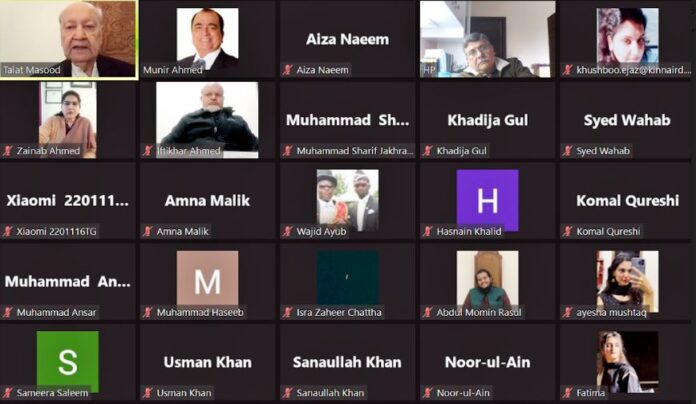Devcom-Pakistan Centre for Geopolitical Studies webinar suggests more political solutions and vigorous diplomacy to improve the bilateral border management, people-to-people contact, trade and visa policies.
Islamabad, JAN 20: /DNA/ – The experts speaking at a webinar on Pakistan-Iran recent crisis urged both the governments and their state institutions to restrain and improve their bilateral ties through vigorous diplomacy. They urged the need for a larger framework for an efficient joint border management to resolve their bilateral strategic concerns including illegal trade, smuggling and the hideouts of the militants on both sides of the border.
The experts also called for people-to-people contacts to improve cultural understanding, formal trade and to soften the visa policies. They said both countries have a history of bilateral cooperation, trade and common cultural values, and they should not be compromised in the stretching scenario of a new Cold War in the region. They also appreciated the role of China between Pakistan-Iran for de-escalation.
The webinar was organized by the Devcom-Pakistan Centre for Geopolitical Studies and DTN here on Saturday. The keynote speakers included Lt General retired Talat Masood, Ambassador retired Naela Chohan and Senator retired Farhatullah Babar. Other guest speakers were the Devcom-Pakistan Centre for Geopolitical Studies Executive Director Munir Ahmed, Lahore Garrison University chairperson International Relations Dr. Zainab Ahmed, Kinnaird College for Women Associate Professor Dr. Khushboo Ejaz, NUST Institute of Policy Studies Assistant Director Sobia Khursheed, and some others.
Lt General (retd) Talat Masood said Pakistan-Iran both have to work on their border management frameworks including strict security measures. Both sides of the border are unpopulated, remain under-developed, and have meagre security and protection against the militants which are being supported by the vested-interest groups and external powers. India could have been another alarming element in supporting the radicals on both sides. He suggested enhancing diplomatic efforts after such a strong response to normalize the situation, revive the bilateral cultural and trade ties for mutual economic recovery.
Ambassador (retd) Naela Chohan said the British rule deliberately left lacunas in the border division. Though they were settled down then, still many don’t believe in the settled-down borderlines. It is for their own vested interests or to serve their external lords, and to create instability within the borders. The Pakistan government and the state institutions have been dealing with the insurgents in rightful manners. But, they have to take more stringent action in the future. The recent Pakistan-Iran crisis has been dealt with intelligently. She termed it as Pakistan’s “successful diplomacy”. Pakistan’s retaliatory strikes have sent a couple of messages to Iran and others as well.
She urged for vigorous bilateral diplomatic and strategic discussions on cross-border terrorism, smuggling and other relevant challenges to restore our historic bilateral relations that both countries used to enjoy in Iran’s pre-revolution era.
Senator Farhatullah Babar said what Iran did is unprecedented and Pakistan’s response was also timely and suitable. Both countries could not handle the states within their states, so facing the brunt of their own security and border mismanagement. We have to look after our own strategic interests instead of playing proxy for other powers and creating monsters for our own society. Immediate de-escalation is positive, but also cast a doubt that the strikes may be with the mutual consents as the target were the militants on both sides. Another scenario, he suggested could be an action by the US-supported agents on the borders to divert global attention from the Gaza genocide by Israel. He suggested that both countries should strictly handle their non-state actors involved in cross-border terrorism.
Devcom-Pakistan Centre for Geopolitical Studies Executive Director Munir Ahmed said: we shall appreciate the forces for adequate response to Iran, also the National Security Committee decision to restore diplomatic ties with Iran. Pakistan-Iran 925 km border management is indeed a gigantic task which could be used by the US-supported militants to fuel up the Cold War 2.0 to deteriorate the situation in the region.
Dr. Zainab Ahmed suggested updating the border management SOPs where India can manipulate the security situation to jeopardize the Indus Water Treaty between the two countries, and also create threats for the CPEC projects. There shall be no political vacuum with the neighbouring countries in particular.
Dr. Khushboo Ejaz said only the border management between Iran-Pakistan would determine the future of bilateral relations. India is investing in Iran’s unpopulated parts and having huge trade while we are reluctant because of the US sanctions. Meanwhile, illegal trade is on the peak benefiting the elements around the border. We shall legalize trade and bilateral social and cultural interventions to strengthen the people-to-people ties and diplomacy.

















